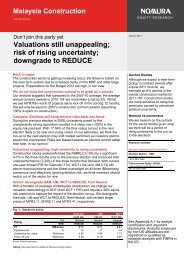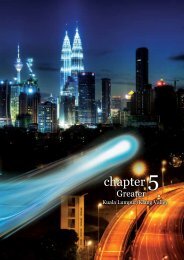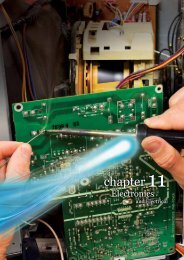Download PDF - ETP - Pemandu
Download PDF - ETP - Pemandu
Download PDF - ETP - Pemandu
You also want an ePaper? Increase the reach of your titles
YUMPU automatically turns print PDFs into web optimized ePapers that Google loves.
EPP 10<br />
By 2020, solar power is expected<br />
to contribute to a minimum of 220<br />
megawatts, as per the target under<br />
the National Renewable Energy Policy.<br />
Therefore, between 2015 and 2020,<br />
Peninsular Malaysia will need to build<br />
approximately four gigawatts of additional<br />
power capacity to meet rising demand<br />
while maintaining a healthy power reserve<br />
margin.<br />
A regulatory framework needs to be<br />
developed, both for the feed-in tariff<br />
(FiT) mechanism as well as for any solar<br />
power plants that may come on stream<br />
once the cost of centralised solar power<br />
generation has reached parity with that of<br />
gas. Secondly, adequate business models<br />
need to be developed, including financing,<br />
public-private partnerships and the role of<br />
the Government, the incumbent generator,<br />
TNB, and private operators. Finally, skills<br />
and learning need to be built in the form<br />
of small amounts of solar generation by<br />
leveraging the FiT mechanism which was<br />
launched on 1 December 2011.<br />
Achievements<br />
The Malaysia FiT programme will<br />
be managed by Sustainable Energy<br />
Development Authority (SEDA), a statutory<br />
body under the Ministry of Energy, Green<br />
Technology and Water (KeTTHA). SEDA<br />
is a dedicated and focussed agency that<br />
serves as a one-stop Renewable Energy<br />
(RE) centre.<br />
As of 28 April 2011, both the RE Bill and<br />
the SEDA Bill were passed by the Dewan<br />
Negara.<br />
SEDA started its operations on 1<br />
September 2011 and its official portal was<br />
also launched.<br />
PM Dato’ Sri Najib Razak on a site visit<br />
Building Up Renewable Energy<br />
and Solar Power Capacity<br />
Wind and solar hybrid plant at Pulau Perhentian Kecil. Photo courtesy of Tenaga Nasional Berhad<br />
Applications for the FiT opened on<br />
1 December 2011, with quota for solar<br />
photovoltaic cells of 150MW, biomass<br />
(including solid waste) of 240MW, biogas<br />
(including landfill) of 90MW and small<br />
hydro of 150MW offered to any interested<br />
party through an open online application<br />
system. The quota allocation for solar<br />
photovoltaic up until 2014 was almost fully<br />
applied for within 24 hours of its launch,<br />
whilst applications for quota allocation<br />
for biomass, biogas and small hydro have<br />
been similarly encouraging.<br />
Cypark Resources Berhad (CRB) will<br />
spearhead an initiative to build an RE<br />
park on 26 hectares of remediated landfill<br />
in Pajam, Nilai, Negeri Sembilan. The<br />
proposed RE park involves the integration<br />
of three potential resources available at<br />
the landfills i.e. solar, landfill gas (biogas),<br />
and waste (biocell) into a scalable<br />
renewable energy project capable of<br />
generating up to 10 megawatts of power<br />
in Pajam landfill alone.<br />
NKEA: Oil, Gas and Energy EPP 9 – EPP 10<br />
This project will be carried out through<br />
the private investment initiative of CRB.<br />
In December 2011, CRB was designated<br />
as one of the FiT approved holders, and<br />
will be allowed to sell solar energy back<br />
to TNB.<br />
Moving Forward<br />
In 2012 the target is to encourage<br />
individuals and households to install solar<br />
cells in their properties through the FiT<br />
campaign. This will incentivise local solar<br />
cell manufacturers to further exploit the<br />
growth in the local solar market, in the<br />
meantime, other sources of renewable<br />
energy such as biomass, biogas & small<br />
hydroelectricity will be continuously<br />
promoted. The possibility of ramping up<br />
the FiT system has been considered, but<br />
will be subject to significant consultation<br />
with the public. SEDA is in discussions<br />
with banks in Malaysia to streamline<br />
applications and draw up a framework<br />
to finance solar and renewable energy<br />
investment projects.<br />
47








